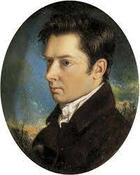
William Hazlitt (1778-1830) is regarded as a prestigious prose writer and essayist, perhaps the best of English romanticism. He was a man of diverse interests, to which he devoted himself in depth: philosophical, artistic, literary and political, which makes him a nuanced and multi-faceted writer.
After an early education from his father, a Unitarian pastor, and later, at the age of fifteen, his studies at the Hackney seminary, Hazlitt soon felt a clear vocation for painting and literature. From this moment on, he trained himself by reading the great philosophers and novelists of the 18th century and also studying medieval and Elizabethan literature, among others. In 1798 he meets Coleridge and Wordsworth, whose poetry he will admire. He also began his friendship with Charles Lamb and joined his circle, the pejoratively known intellectuals of the Cockney School. In 1802 he travels to Paris, where he studies painting. It will be during this stay that his interest in Napoleon Bonaparte is awakened, to whom he will dedicate a biography.
In 1808 Hazlitt left the plastic arts to focus on literature, becoming a professional lecturer, journalist and essayist. He was very fruitful, and his stripped, direct and elegant way of writing is fresh and close. He himself reflected on his style, which he called familiar.
Despite Hazlitt's recognition, his existence was not easy. This, in part, because of his radicalism: akin to the French Revolution, he always remained faithful to these principles and did not yield to anyone, attacking all those who forgot the revolutionary fervor. Thus, he was distancing himself from friends and creating enemies. He died poor but content and proud of his fate.
The texts that we present treat the subject of death, and it seems that the writer foresaw his near end, which he accepts with the same equanimity and naturalness with which he faced his fate.




